International Management Report: Cultural Influences on Business
VerifiedAdded on 2023/01/06
|13
|754
|88
Report
AI Summary
This report examines the crucial role of international management in global business operations, focusing on how national and organizational cultures influence business conduct. It explores cultural dimensions, using examples from Germany, Brazil, and Japan. The report analyzes how companies like Deloitte adapt strategies to navigate diverse cultural landscapes and achieve market success. It also highlights the importance of understanding cultural differences to overcome barriers and improve working efficiency. The report concludes by emphasizing the impact of cultural factors on corporate culture and overall business performance in the international context. The report references various academic sources to support its findings.

International Management
Paraphrase This Document
Need a fresh take? Get an instant paraphrase of this document with our AI Paraphraser
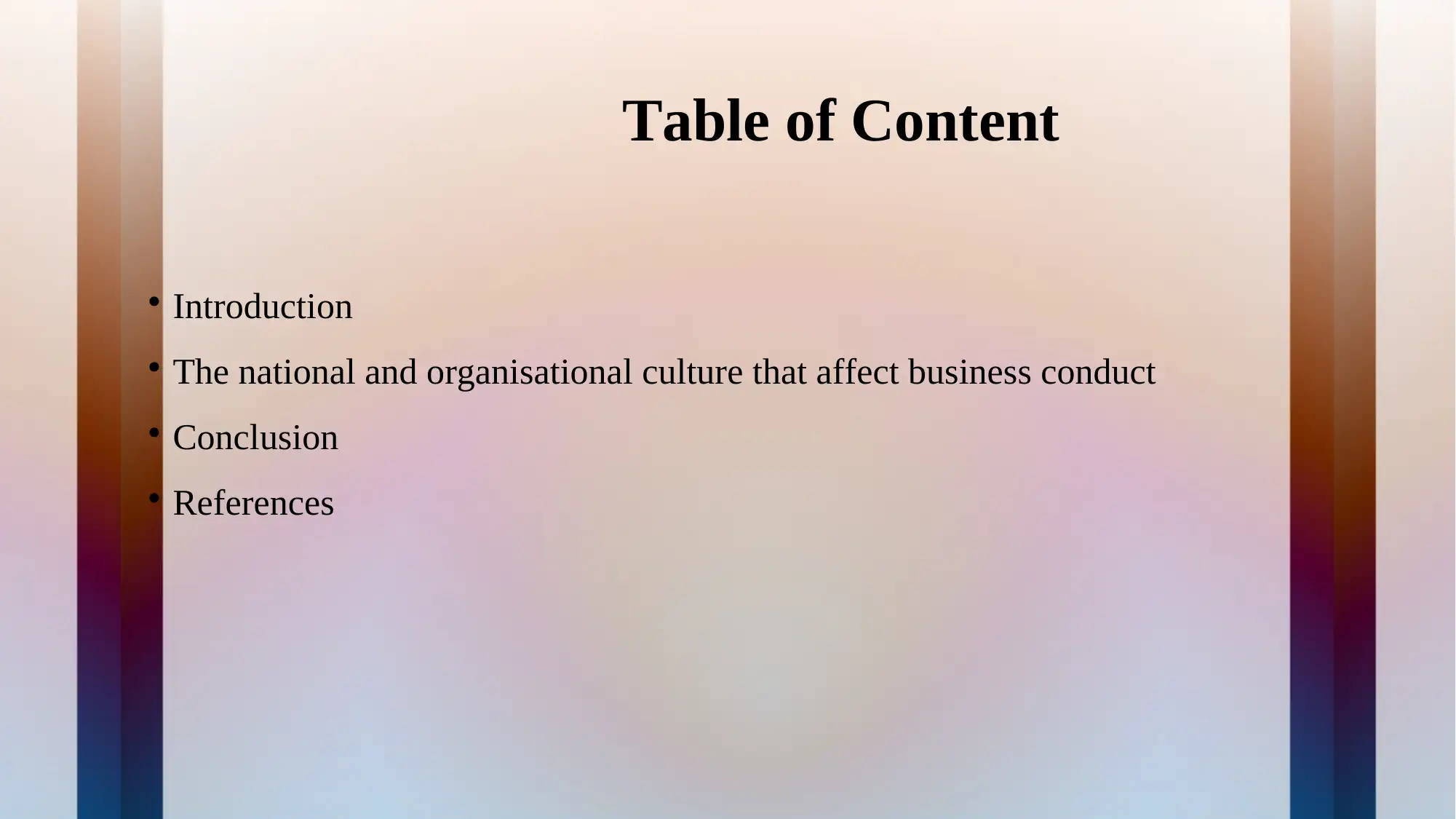
Table of Content
Introduction
The national and organisational culture that affect business conduct
Conclusion
References
Introduction
The national and organisational culture that affect business conduct
Conclusion
References
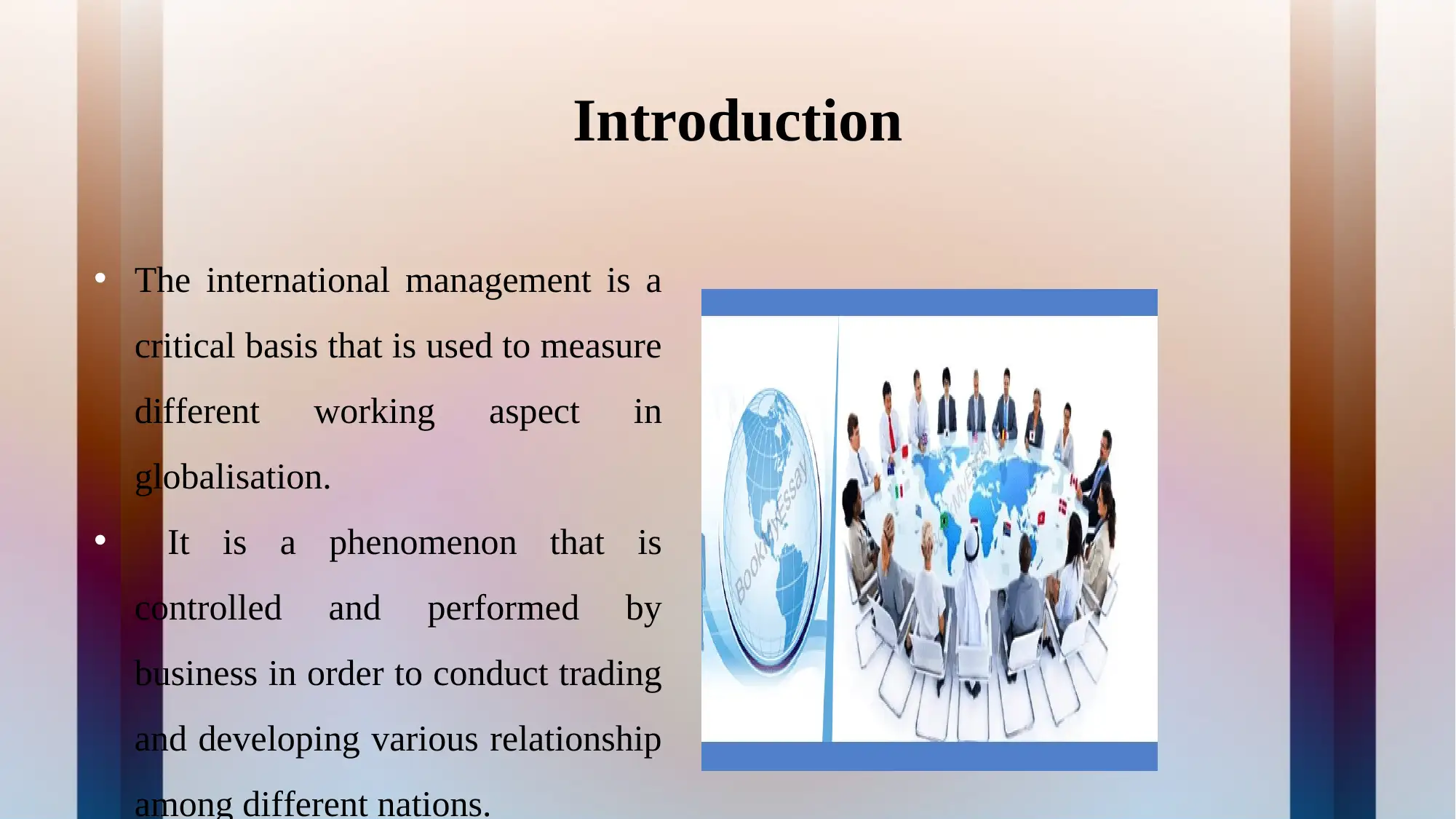
Introduction
• The international management is a
critical basis that is used to measure
different working aspect in
globalisation.
• It is a phenomenon that is
controlled and performed by
business in order to conduct trading
and developing various relationship
among different nations.
• The international management is a
critical basis that is used to measure
different working aspect in
globalisation.
• It is a phenomenon that is
controlled and performed by
business in order to conduct trading
and developing various relationship
among different nations.
⊘ This is a preview!⊘
Do you want full access?
Subscribe today to unlock all pages.

Trusted by 1+ million students worldwide
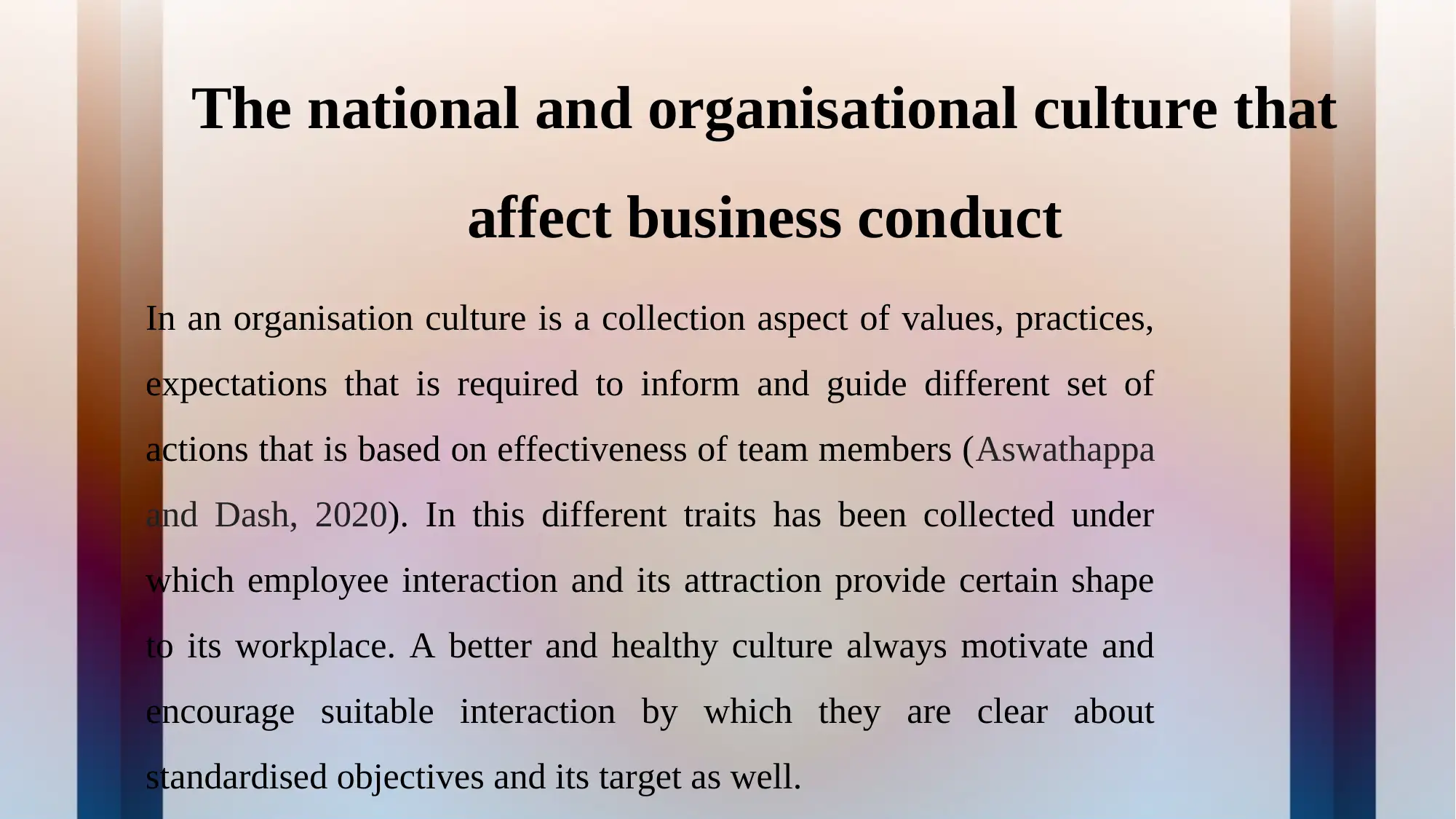
The national and organisational culture that
affect business conduct
In an organisation culture is a collection aspect of values, practices,
expectations that is required to inform and guide different set of
actions that is based on effectiveness of team members (Aswathappa
and Dash, 2020). In this different traits has been collected under
which employee interaction and its attraction provide certain shape
to its workplace. A better and healthy culture always motivate and
encourage suitable interaction by which they are clear about
standardised objectives and its target as well.
affect business conduct
In an organisation culture is a collection aspect of values, practices,
expectations that is required to inform and guide different set of
actions that is based on effectiveness of team members (Aswathappa
and Dash, 2020). In this different traits has been collected under
which employee interaction and its attraction provide certain shape
to its workplace. A better and healthy culture always motivate and
encourage suitable interaction by which they are clear about
standardised objectives and its target as well.
Paraphrase This Document
Need a fresh take? Get an instant paraphrase of this document with our AI Paraphraser
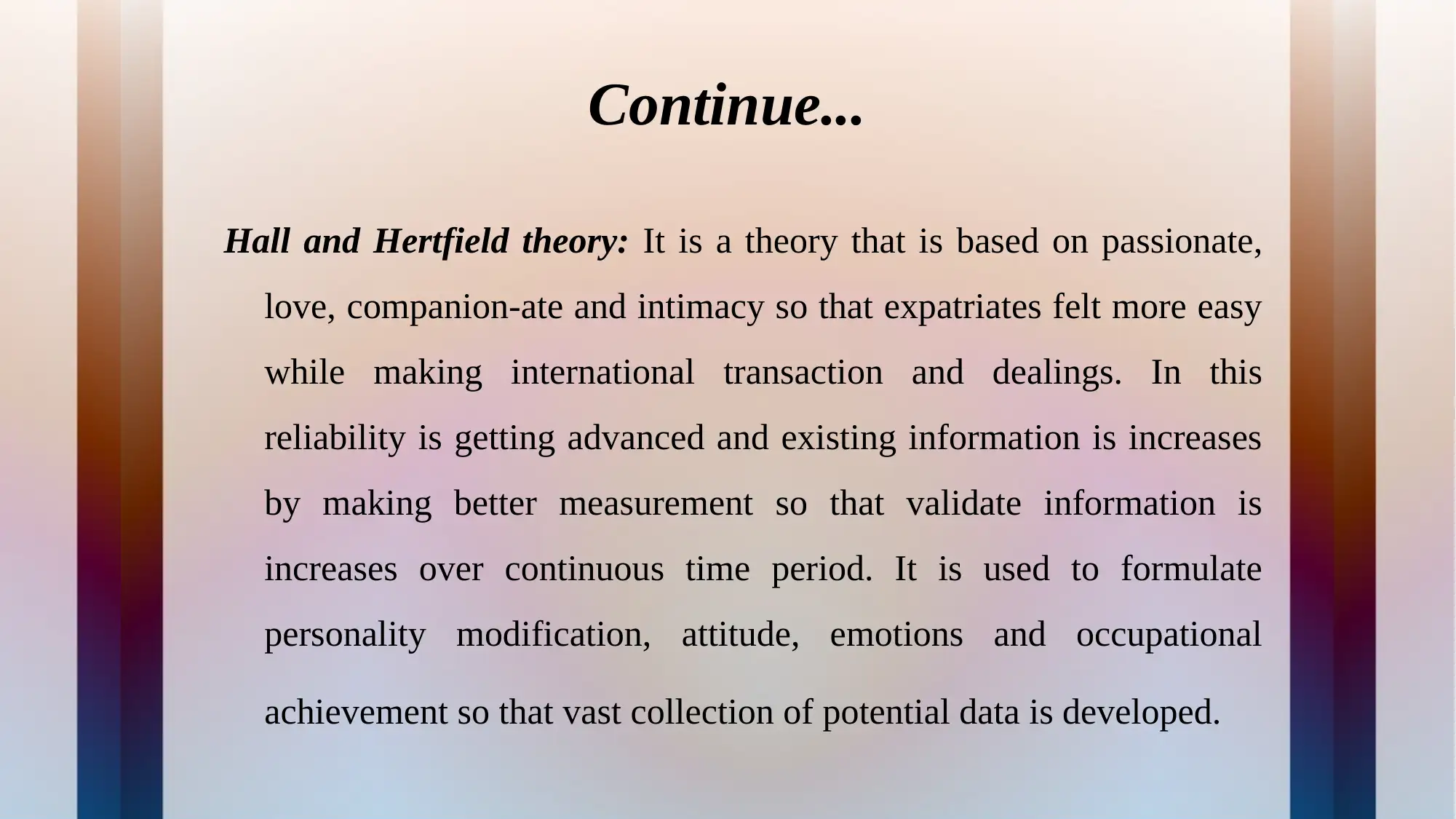
Continue...
Hall and Hertfield theory: It is a theory that is based on passionate,
love, companion-ate and intimacy so that expatriates felt more easy
while making international transaction and dealings. In this
reliability is getting advanced and existing information is increases
by making better measurement so that validate information is
increases over continuous time period. It is used to formulate
personality modification, attitude, emotions and occupational
achievement so that vast collection of potential data is developed.
Hall and Hertfield theory: It is a theory that is based on passionate,
love, companion-ate and intimacy so that expatriates felt more easy
while making international transaction and dealings. In this
reliability is getting advanced and existing information is increases
by making better measurement so that validate information is
increases over continuous time period. It is used to formulate
personality modification, attitude, emotions and occupational
achievement so that vast collection of potential data is developed.
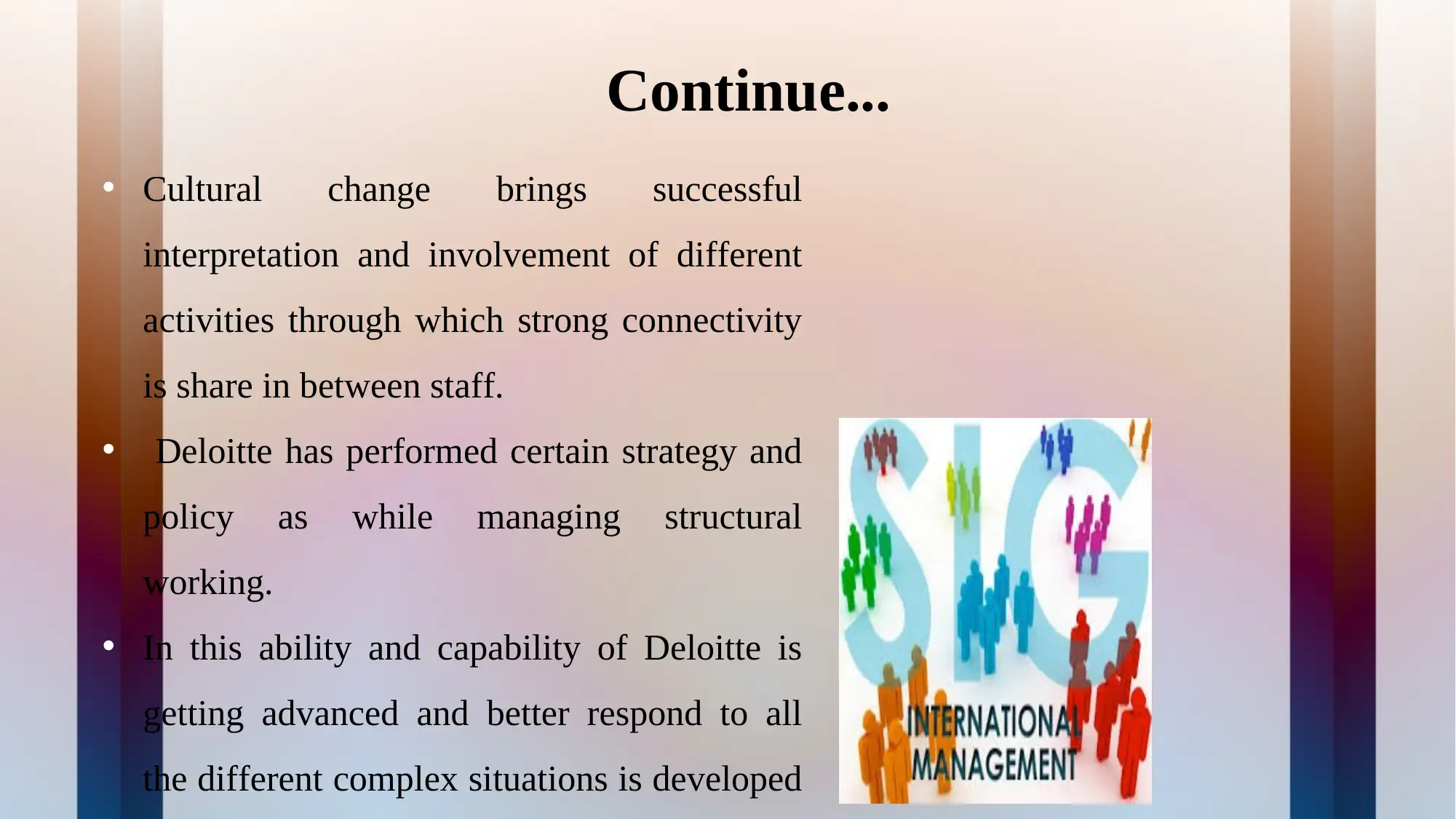
Continue...
• Cultural change brings successful
interpretation and involvement of different
activities through which strong connectivity
is share in between staff.
• Deloitte has performed certain strategy and
policy as while managing structural
working.
• In this ability and capability of Deloitte is
getting advanced and better respond to all
the different complex situations is developed
• Cultural change brings successful
interpretation and involvement of different
activities through which strong connectivity
is share in between staff.
• Deloitte has performed certain strategy and
policy as while managing structural
working.
• In this ability and capability of Deloitte is
getting advanced and better respond to all
the different complex situations is developed
⊘ This is a preview!⊘
Do you want full access?
Subscribe today to unlock all pages.

Trusted by 1+ million students worldwide
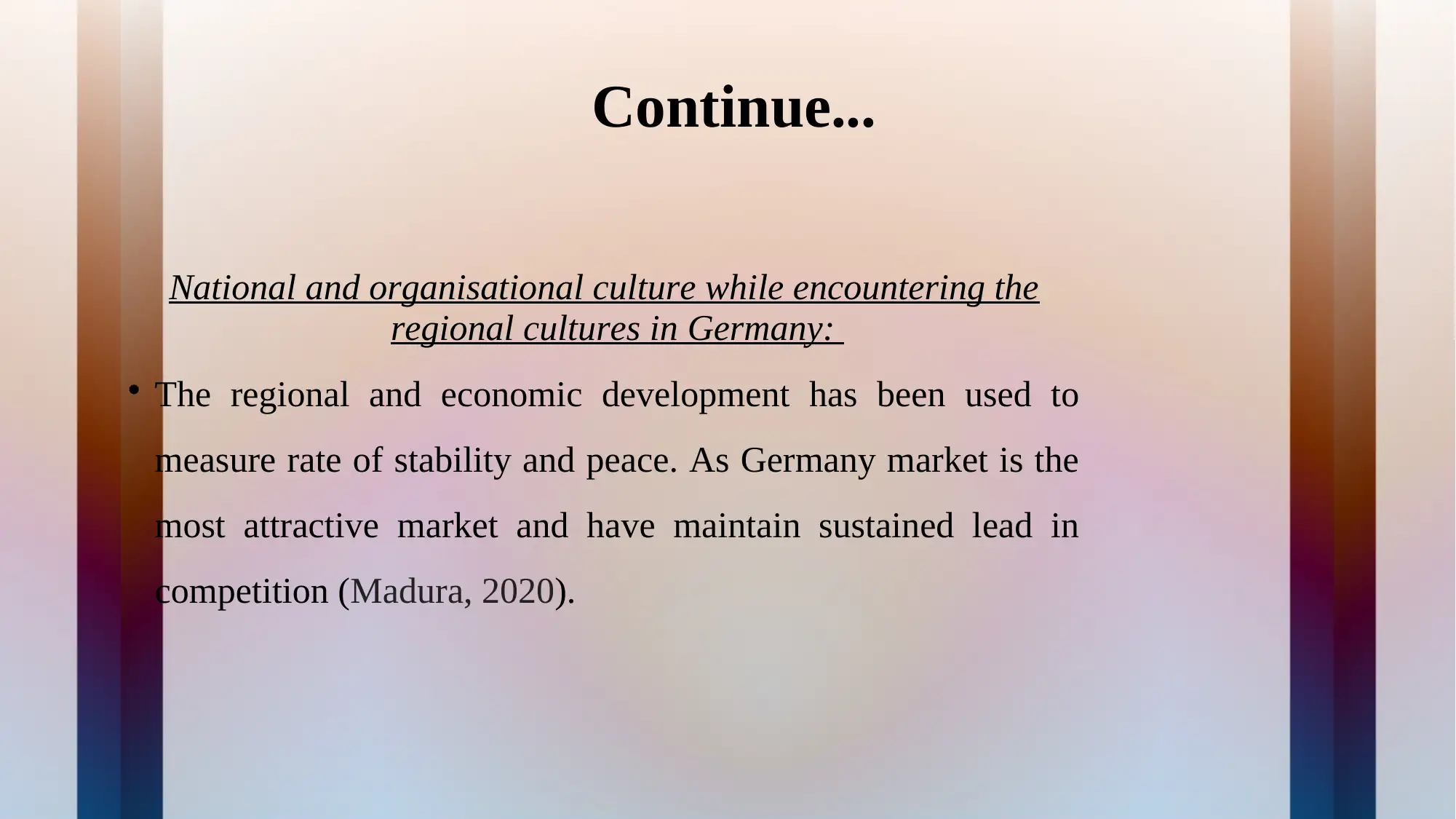
Continue...
National and organisational culture while encountering the
regional cultures in Germany:
The regional and economic development has been used to
measure rate of stability and peace. As Germany market is the
most attractive market and have maintain sustained lead in
competition (Madura, 2020).
National and organisational culture while encountering the
regional cultures in Germany:
The regional and economic development has been used to
measure rate of stability and peace. As Germany market is the
most attractive market and have maintain sustained lead in
competition (Madura, 2020).
Paraphrase This Document
Need a fresh take? Get an instant paraphrase of this document with our AI Paraphraser
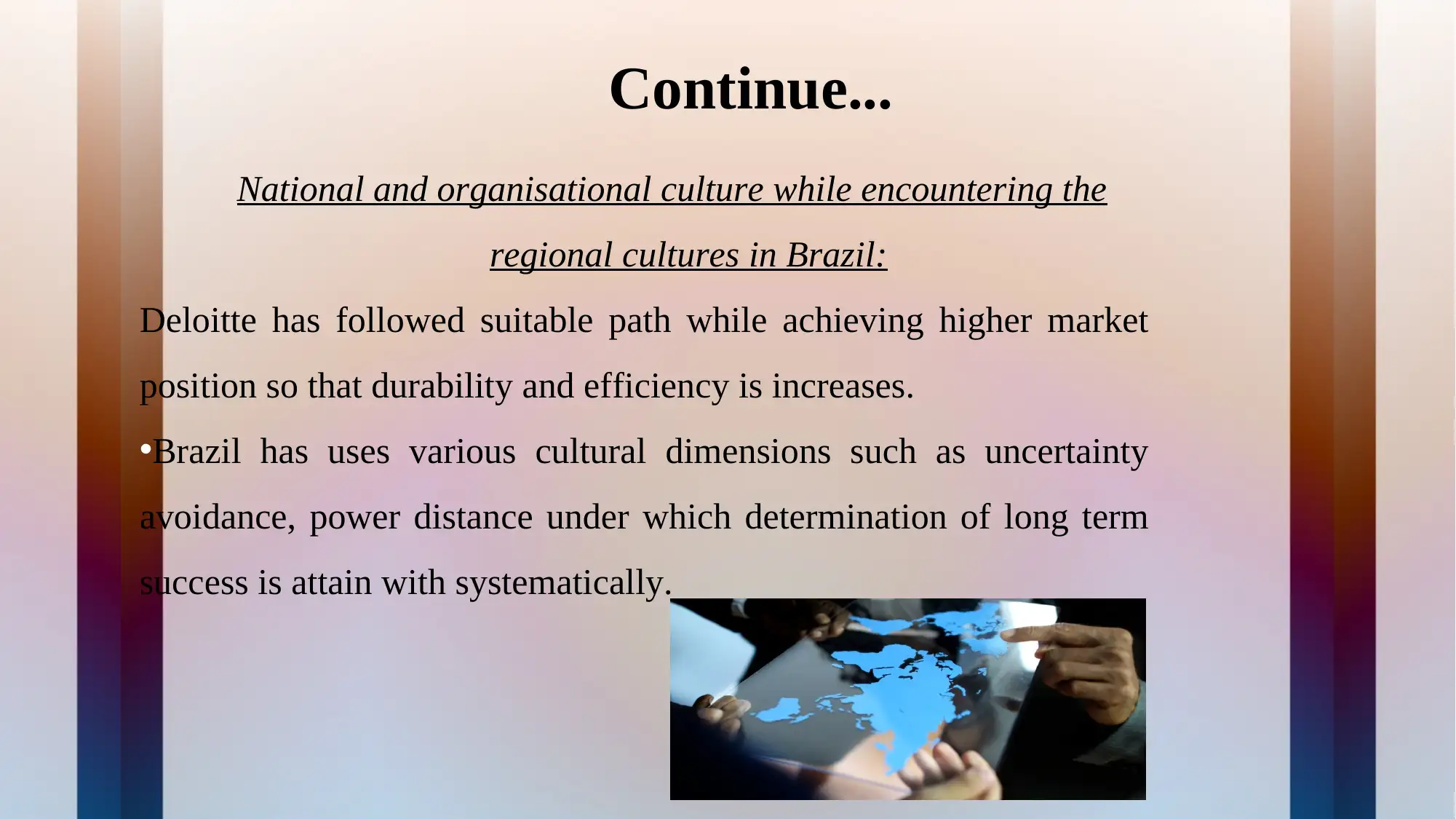
Continue...
National and organisational culture while encountering the
regional cultures in Brazil:
Deloitte has followed suitable path while achieving higher market
position so that durability and efficiency is increases.
•Brazil has uses various cultural dimensions such as uncertainty
avoidance, power distance under which determination of long term
success is attain with systematically.
National and organisational culture while encountering the
regional cultures in Brazil:
Deloitte has followed suitable path while achieving higher market
position so that durability and efficiency is increases.
•Brazil has uses various cultural dimensions such as uncertainty
avoidance, power distance under which determination of long term
success is attain with systematically.
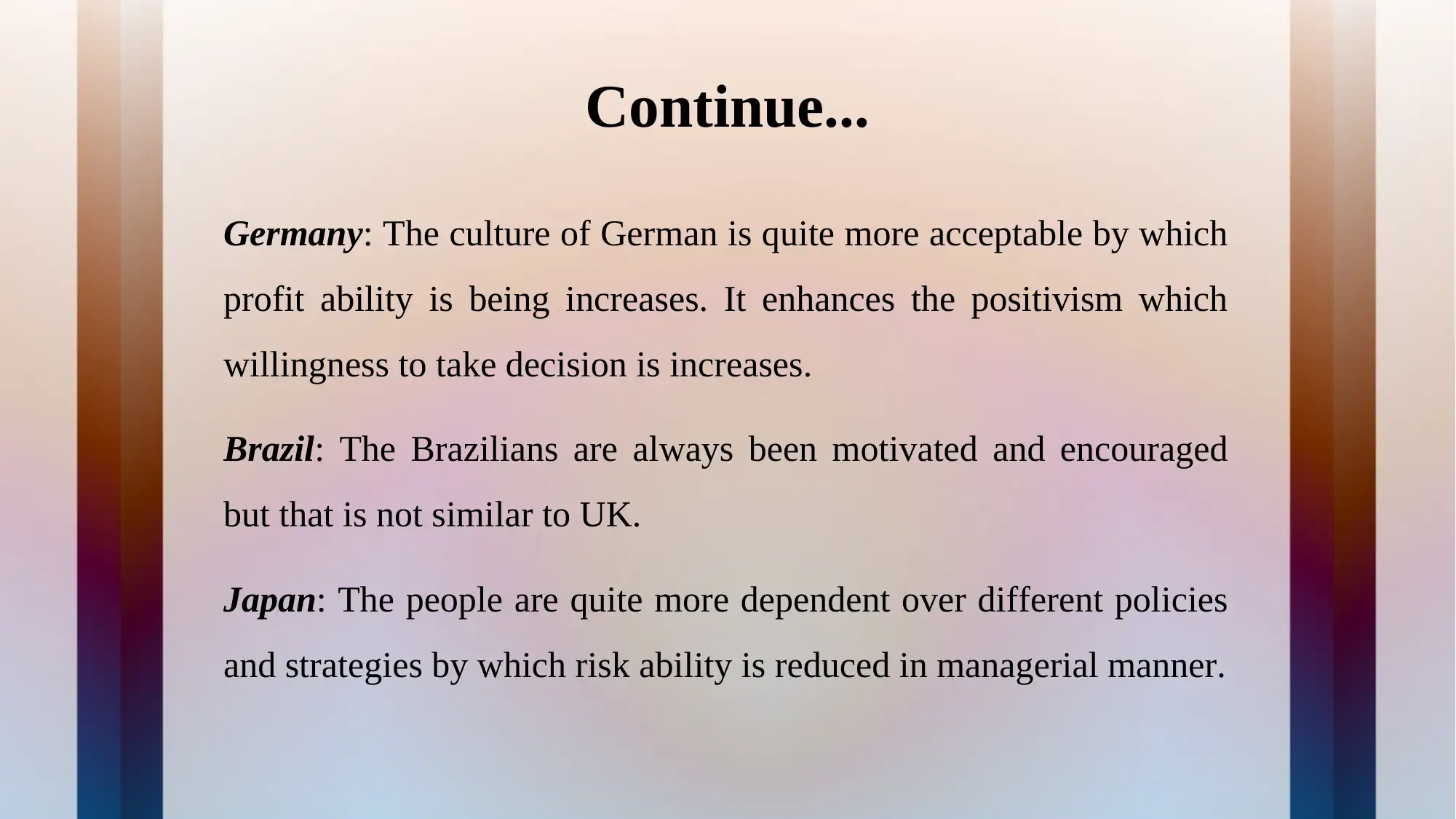
Continue...
Germany: The culture of German is quite more acceptable by which
profit ability is being increases. It enhances the positivism which
willingness to take decision is increases.
Brazil: The Brazilians are always been motivated and encouraged
but that is not similar to UK.
Japan: The people are quite more dependent over different policies
and strategies by which risk ability is reduced in managerial manner.
Germany: The culture of German is quite more acceptable by which
profit ability is being increases. It enhances the positivism which
willingness to take decision is increases.
Brazil: The Brazilians are always been motivated and encouraged
but that is not similar to UK.
Japan: The people are quite more dependent over different policies
and strategies by which risk ability is reduced in managerial manner.
⊘ This is a preview!⊘
Do you want full access?
Subscribe today to unlock all pages.

Trusted by 1+ million students worldwide
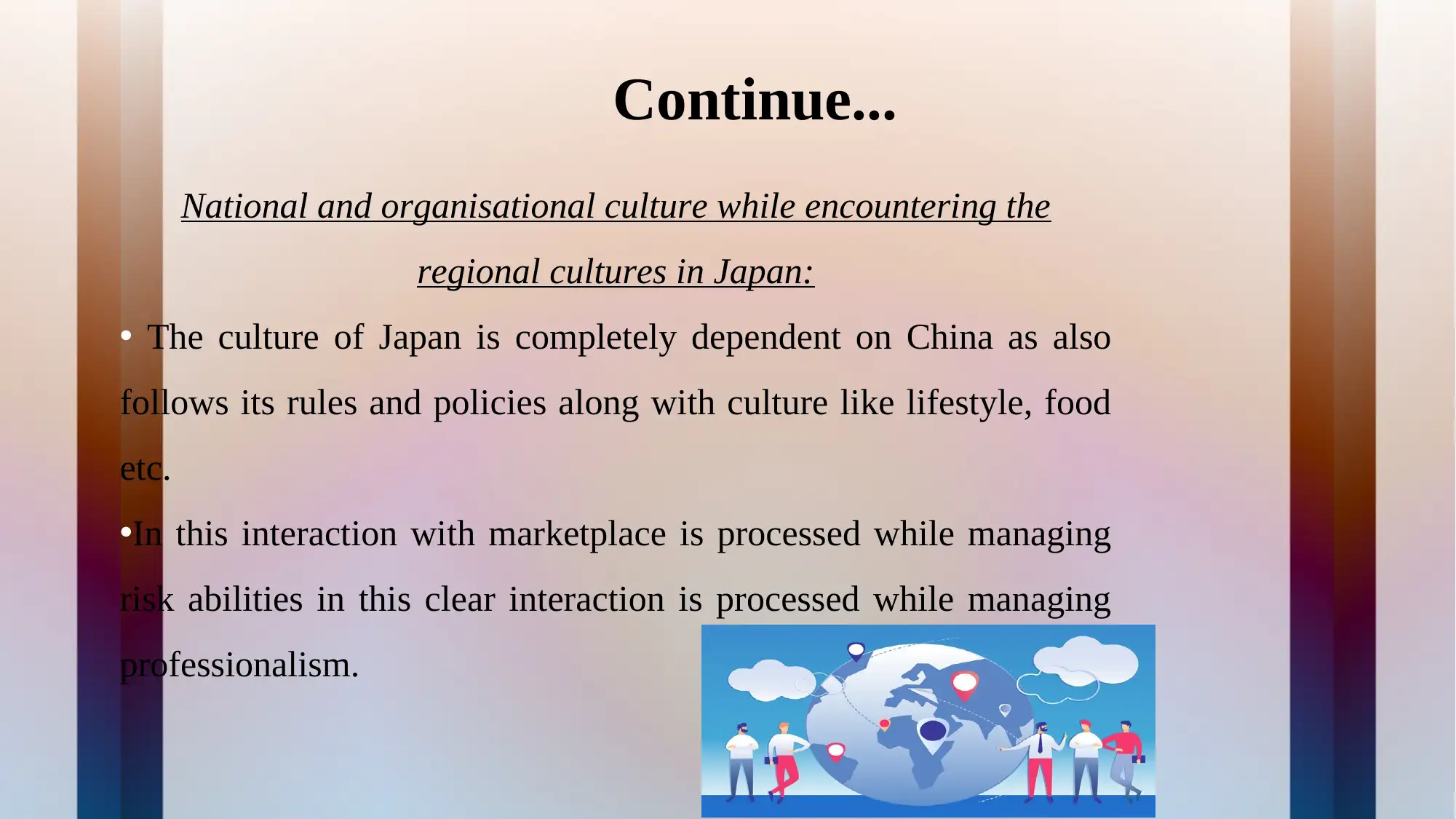
Continue...
National and organisational culture while encountering the
regional cultures in Japan:
• The culture of Japan is completely dependent on China as also
follows its rules and policies along with culture like lifestyle, food
etc.
•In this interaction with marketplace is processed while managing
risk abilities in this clear interaction is processed while managing
professionalism.
National and organisational culture while encountering the
regional cultures in Japan:
• The culture of Japan is completely dependent on China as also
follows its rules and policies along with culture like lifestyle, food
etc.
•In this interaction with marketplace is processed while managing
risk abilities in this clear interaction is processed while managing
professionalism.
Paraphrase This Document
Need a fresh take? Get an instant paraphrase of this document with our AI Paraphraser
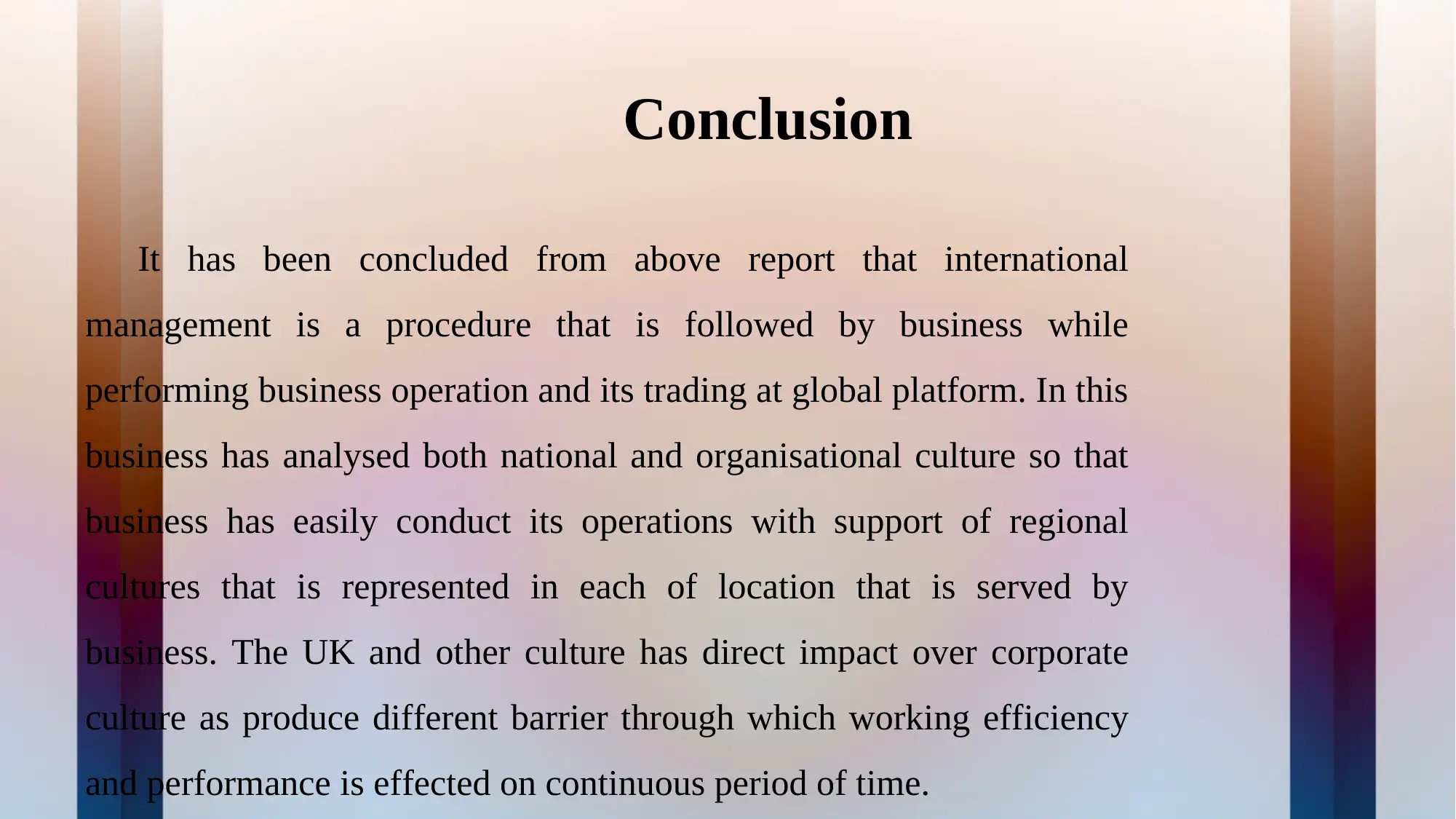
Conclusion
It has been concluded from above report that international
management is a procedure that is followed by business while
performing business operation and its trading at global platform. In this
business has analysed both national and organisational culture so that
business has easily conduct its operations with support of regional
cultures that is represented in each of location that is served by
business. The UK and other culture has direct impact over corporate
culture as produce different barrier through which working efficiency
and performance is effected on continuous period of time.
It has been concluded from above report that international
management is a procedure that is followed by business while
performing business operation and its trading at global platform. In this
business has analysed both national and organisational culture so that
business has easily conduct its operations with support of regional
cultures that is represented in each of location that is served by
business. The UK and other culture has direct impact over corporate
culture as produce different barrier through which working efficiency
and performance is effected on continuous period of time.
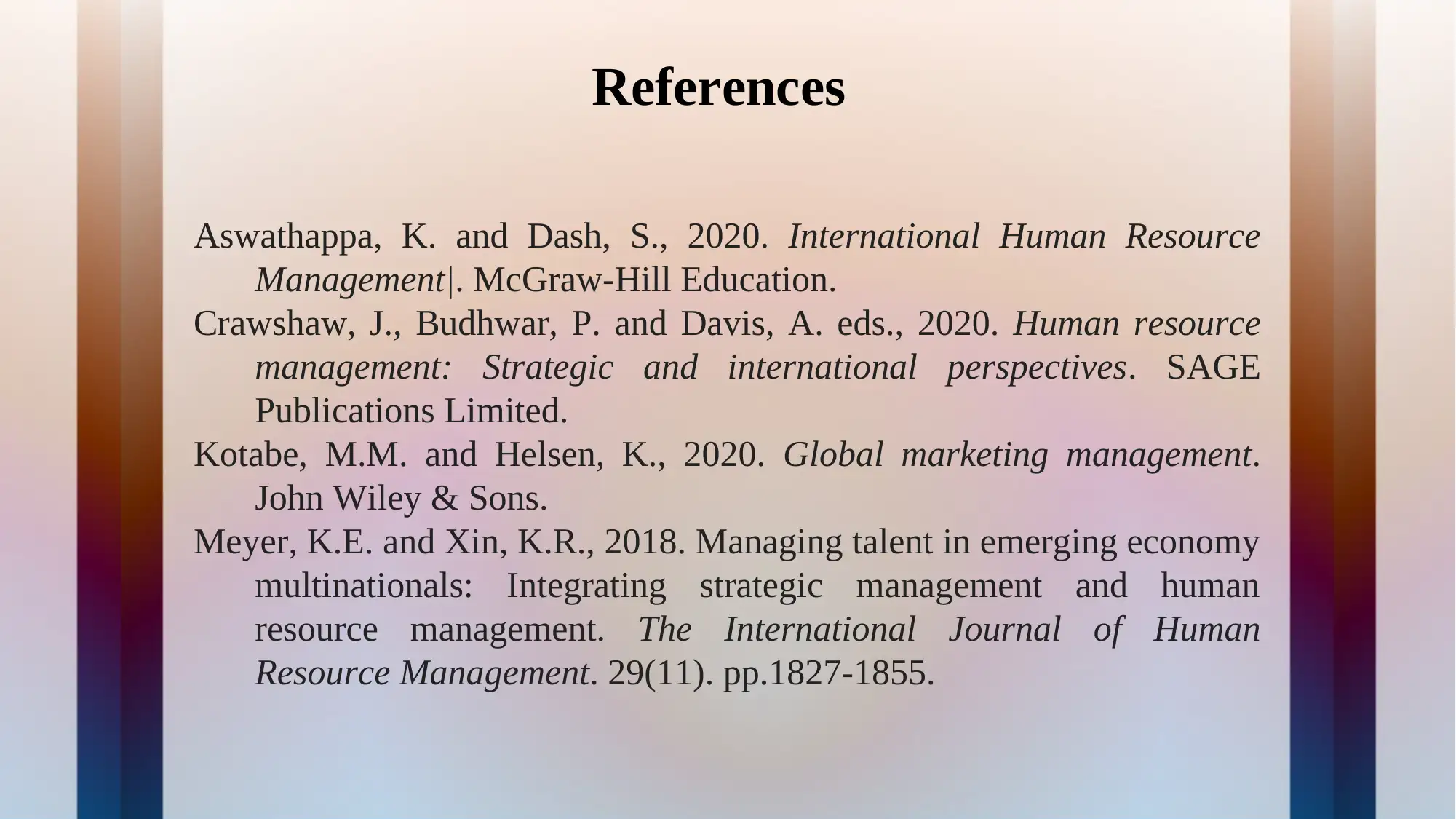
References
Aswathappa, K. and Dash, S., 2020. International Human Resource
Management|. McGraw-Hill Education.
Crawshaw, J., Budhwar, P. and Davis, A. eds., 2020. Human resource
management: Strategic and international perspectives. SAGE
Publications Limited.
Kotabe, M.M. and Helsen, K., 2020. Global marketing management.
John Wiley & Sons.
Meyer, K.E. and Xin, K.R., 2018. Managing talent in emerging economy
multinationals: Integrating strategic management and human
resource management. The International Journal of Human
Resource Management. 29(11). pp.1827-1855.
Aswathappa, K. and Dash, S., 2020. International Human Resource
Management|. McGraw-Hill Education.
Crawshaw, J., Budhwar, P. and Davis, A. eds., 2020. Human resource
management: Strategic and international perspectives. SAGE
Publications Limited.
Kotabe, M.M. and Helsen, K., 2020. Global marketing management.
John Wiley & Sons.
Meyer, K.E. and Xin, K.R., 2018. Managing talent in emerging economy
multinationals: Integrating strategic management and human
resource management. The International Journal of Human
Resource Management. 29(11). pp.1827-1855.
⊘ This is a preview!⊘
Do you want full access?
Subscribe today to unlock all pages.

Trusted by 1+ million students worldwide
1 out of 13
Related Documents
Your All-in-One AI-Powered Toolkit for Academic Success.
+13062052269
info@desklib.com
Available 24*7 on WhatsApp / Email
![[object Object]](/_next/static/media/star-bottom.7253800d.svg)
Unlock your academic potential
Copyright © 2020–2026 A2Z Services. All Rights Reserved. Developed and managed by ZUCOL.





